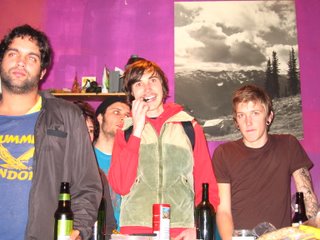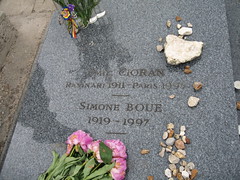Sunday, December 31, 2006
books read for 2006
* = a friend made me read it
# = a writer or about writer who has committed suicide (that I know)
1. Across the Acheron -Monique Wittig
2. The Math Gene -Keith Devlin
3. Isabelle: the Life of Isabelle Eberhardt -Annette Kobak
4. A Chance Meeting -Rachel Cohen
5. The Immense Journey -Loren Eiseley
6. The Dispossessed -Ursula LeGuin
7. The Death and Death of Great American Cities -Jane Jacobs
8. What am I Doing Here? -Bruce Chatwin
9. Ludwig Wittgenstein: A memoir -Norman Malcom
10. Madame Bovary -Gustave Flaubert (trans. Paul de Man)
11.Three Women (Alma Mahler-Werfel, Gertrude Stein, Lous Andres-Salome) -Walter Sorell
12. The Road to Santiago -Kathryn Harrison
13. Fin de Siècle Vienna -Carl Schorske
14. Gathering Moss: A Natrual & Cultural History of Mosses -Robin Wall Kimmerer
15. # Moscow Diary -Walter Benjamin
16. # The Disinherited: The Life of Gérard de Nerval -Benn Sowerby
17. The Urban Ideal: conversations with Paolo Soleri
18. City Life: Urban Expectation in a New World -Witold Rybczynski
19. *Passage -Connie Willis
20. Color: A Natural History of the Palette -Victoria Finlay
21. The Flâneur -Edmund White
22. # The World of Yesterday -Stefan Zweig
23. Sade my Neighbor -Pierre Klossowski
24. California Forests and Woodlands: A Natural History -Verra R. Johnston
25. Oakland: A History -G.A. Cummings & E.S. Pladwell
26. Waiting for Godot -Samuel Beckett
27. # Insatiability -Stanislaw I. Witkiewicz
28. My Lives -Edmund White
29. *Bellwether -Connie Willis
30. Stiff: The Curious Lives of Human Cadavers -Mary Roach
31. Nausea -Jean-Paul Sartre
32. Tête –à Tête -Hazel Rowley
33. # Shadows of the Sun: The Diaries of Harry Crosby ed. Edward Germain
34. Exquisite Corpse: Surrealism and the Black Dahlia Murder -Mark Nelson & Sarah Bayliss
35. # Freud's Vienna and other Essays -Bruno Bettelheim
36. # The Painted Bird -Jerzy Kosinski
37. Blue Angel -Francine Prose
38. Faust & Yakov Pasynkov -Ivan Turgenev
39. The Portrait of Mr. W.H. -Oscar Wilde
40. Justine -Lawrence Durrell
41. The Great Gatsby -F. Scott Fitzgerald
42. The Modern Mind: An Intellectual History of the 20th Century -Peter Watson
43. Blue of Noon -Georges Bataille
44. Shakespeare and Company -Sylvia Beach
45. #A Room of One's Own -Virginia Woolf
46. The Great Pianists -Harold Schonberg
47. Curious Naturalists -Niko Tinbergen
Tuesday, December 26, 2006
ataraxy
The past has past. I can't complain, nor would I want to. I drank three pots of pu-erh on Christmas Eve. and read the biography of Weldon Kees. I felt calm; this is the way I hope always get to spend my free time: books and tea (or an amaretto sour). I sincerely hope that all those who I have loved are loved now. I wish them all moments of joy.
A quick link of an article on Weldon Kees-
http://www.newyorker.com/critics/atlarge/articles/050704crat_atlarge?050704crat_atlarge
kisses~
Thursday, December 14, 2006
esurient


"The great naturalist, Fritz Müller- who was the first to describe the scent scales- mentions how, on his journeys in Brazil, he often carried a Paplio Grayi with him, just for the purpose of sniffing its scent when the mood took him." - Niko Tinbergen Curious Naturalists
"Ulysses, like everything else of Joyce's, was written entirely by hand. He used blunt black pencils- he found the ones he wanted at Smith's in Paris-and pencils of different colors to distinguish the parts he was working on. Fountain pens he didn't understand at all. They bewildered him. Once I found him struggling to fill one, covering himself with ink as he did so. Sylvia Beach Shakespeare and Company
Quicknotes on the books I finished reading this week:
The Great Gatsby, by F. Scott Fitzgerald. I read it before when I was young. Now after reading it again, I am convinced I should read it at least once every other year. As I was reading, I would come across an amazing line that I would want to write down, but I just couldn't stop reading. Nothing I have read exposes the farce of the American dream as well as this novel. Material desires hiding the gaping emptiness of a life not examined.
I finished up the novel while I was at Bourbon & Branch in SF, a faux speakeasy-era bar with expensive, but good-looking cocktails; I had two. A few things I learned: Fitzgerald was an alcoholic, but he never wrote drunk, he was an amazingly sober writer and it shows in his prose. He was born in Minnesota; a Mid-Westerner transplanted to the East Coast; like Gatsby. And like Gatsby, Fitzgerald fell in love with a socialite (Zelda) who rebuffed his initial marriage proposal. He wrote his first novel, which became a success, he made some money, and he got to marry the girl; who ended up going insane and was confined to a mental institution. Nothing like love to drive you mad.
Speaking of mad, I also read The Blue of Noon, by Georges Bataille. Talk about a crazy novel, leave to Georges to leave me with my mouth open, thinking, "I can't believe someone wrote that." My head spun reading this novel of drunkenness and despair; written in 1935, all around, Europe falls into pieces and the characters lose themselves in grotesque debauchery and perversity.
I also read The Modern Mind, by Peter Watson. A dash into the great-breaking ideas that affected and transformed the 19th-20th Centuries. There's some decent reviews of the book here. I agree with most of it. It is a good book to get started on developing a foundation of historical understanding for the last 100+ years. Watson's analyses on novels were succinct and inspired, so much that I added another half dozen to read, plus I read The Great Gatsby again. I developed a mini-crush on this Watson fellow, even though he's older than my father. I imagined all the books he must have read, all the mental calculations it took to connect it together in this massive book; and it fulfilled my esurient need for understanding how the parts fit together. It could have plodded along, but Watson uses his journalistic skill to keep it an engaging read.
Wednesday, December 13, 2006
Blue


"My life was following an increasingly crooked path. I used to go to various places for drinks, walk around aimlessly, and finally take a taxi home. It was then, in the depths of the taxi that I could think of Dirty and burst out sobbing. I no longer even felt any pain, or the least anxiety; inside my head, I was aware of nothing but absolute stupidity. It was like a state of perpetual childishness. I was shocked by the madness enacted by my wild state of mind whenever I wanted to tempt fate, and I recalled the irony and courage I had shown; and, of all that, the one thing left was the feeling that I was some kind of idiot, extremely touching perhaps, but in any care ludicrous. " Georges Bataille Blue of Noon
Monday, December 11, 2006
Friday, December 08, 2006
Treehouses in Turkey
Cioran's grave at Cimetière du Montparnasse, Paris
Since I'm being personal-
Thoughts which come to my head when it is 2AM and I am faced with a second night of sleeplessness:
I often wonder if romantic love is a folie à deux, a sort of socially-sanctioned lunacy; and I want out of the madhouse. I wonder if sex and love collide into a dangerous cocktail of delusion; a sly toxin intoxicating the imbiber with destructive dreams. Romance is one bland illusion, slated to disappoint every time.
If some moony-eyed moron ever comes running towards me babbling such love-laced obscenities, I 'm going to punch him square between the eyes to clear his head. "Proselytize elsewhere," I will scoff, "I'm an ex-convert of your crap religion."
Maybe it's just me. After all, I have sought out these very captivating jailors, only to resent the trap I help them create to confine me. A part of me (a large part) feels that I would prefer to run off to some remote city in Iceland and spend the rest of my life reading books, never to speak to anyone I know, ever again (or maybe a tree house in Turkey- if there are still trees in Turkey).
I love my current boyfriend, I really do. I think he's the kindest, most charming person I know. And, despite my seemingly grouchy demeanor, I do believe in love and relationships. I believe in the kind where people genuinely like to talk to each other and like each other's company. I believe in someone who will stroke your hair when you are saddened by the world, and who will give you kisses on the head before you go to sleep.
I do not believe in the tumultuous, storm-saturation that masquerades as some sort of emotional connection. I will never allow myself to fall into that silliness ever again.
Then again, maybe I just need more sleep.
Wednesday, December 06, 2006
Under capitalism, man exploits man. Under communism, it's just the opposite

Brassaï's grave in Cimetière du Montparnasse, Paris
While I was looking up some info about J.K. Galbraith, I ran into these capitalist/communist jokes. Galbraith is credited with this quip, but actually, he only reported it in his memoirs. I like this version of the abovementioned joke because it reminds me of a man I met while I was in Moscow in 2005.
Q: Is there a difference between capitalism and communism?
A: In principle, yes. In capitalism, man exploits man. In communism, it's the reverse.
I thought it was a quirk that he began many of his sentences with, "In principal…." But now I understand there may have been a precedent for it. See below for other jokes and quotes!
Personally, the last week had been spent with having a bloody nose a day, and having very negative feelings about a past relationship (CC). When I remember certain events which happened in this relationship, I am filled with disappointment of how things never turned out, and disgust with myself for letting myself be treated with such blatant disrespect and inconsideration. But in the end I realize, people are as they are. You cannot expect or demand love from anyone. If they chose to give it to you, then it is a gift. If you give love to someone who does not recognize the value of it, you cannot take it personally. This love has no value to them, and there is nothing that you can do to change that. You should not let their attitude devalue you. I had let myself be devalued for too long, and it upsets me.
But then I had this dream last night. I think it was brain telling me why I allowed myself to be in this situation. It was a reminder of what I liked about this person. Where the relationship was despairing most of the time; the friendship was really valuable to me. I don't know why we didn't just stay friends and not cross into that relationship line; that was our worst mistake.
The dream:
There is a performance in a warehouse with CC and some other people. I am undecided in attending because I don't want to see CC, however, another person who is performing asks me to come up, so I do. I expect that CC will give me the cold, indifferent treatment, as he often does, so I stand in an out of the way place. To my surprise, he comes to me and gives me a hug. We have a little awkward conversation. The performance happens- then I am about to leave. CC offers to walk with me. We walk around the city, looking a various things. One thing is a series of transport devices which allows a person to turn a crank and a plank moves in a spiral way to allow the person to travel great distances with little effort. Sometimes we are in a car. We talk and walk around in a very friendly fashion, overall I feel happy about this. The dream then moves onto something else, which I don't remember.
When I woke up, I felt better about the situation. I doubt this friendly interaction will ever happen between us, but I guess the memory of how we used to be friends makes me feel a little better.
Now some levity:
We pretend to work and they pretend to pay us,
Under Communism speech is strictly regulated, so opinion goes unheard.Under Capitalism speech is totally free, so opinion goes unheard.
Q: Is it true that the poet Vladimir Mayakovsky committed suicide?
A: Yes, it is true, and even the record of his very last words is preserved: "Don't shoot, comrades."
Q: Is it true that Tchaikovsky was homosexual?
A: Yes, but we love him not only for this.
Monday, December 04, 2006
Cabinet particulier

Samuel Beckett's grave in Cimetière du Montparnasse, Paris- May 2006
"Under modernity there can be no question about the moral authority of the self. The only question is that of how the self is to be fulfilled-by hedonism, by acquisitiveness, by faith, by the privatisation of morality or by sensationalism." -Daniel Bell (from Peter Watson's The Modern Mind)
A decent review of the book, Casanova's Women, a rather titillating read for a Monday-
http://www.salon.com/books/review/2006/12/02/summers/index.html
Friday, December 01, 2006
modernist novels


Downtown Oakland
"Far off events, transformed by memory, acquire a burnished brilliance because they are seen in isolation, divorced from the details of before and after, the fibres and wrappings of time. The actors, too, suffer a transformation; they sink slowly deeper and deeper into the ocean of memory like weighted bodies, finding at every level a new assessment, a new evaluation in the human heart." Lawrence Durrell Justine
I finished reading this last night. Another classic which embodies the characterists of the modernist novel. A good review here. And if you want to read a 30 page interview with Durrell to learn about his roving life in between the world wars- go here.
And if you want to understand the modernist novel- here's a handy little comparison I found.











